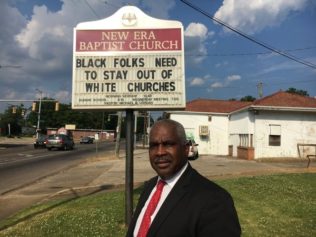
Pastor John Gray III, who has served under Joel Osteen and is the new senior pastor at Redemption Church in Greenville, South Carolina, has concerns over those who “pimp” the church and others to enrich themselves. (Photo: Pixabay)
Is there a difference between the pimping of church parishioners and prosperity gospel? Jesus was known for helping the poor and providing comfort to the sick, and standing up to the wealthy and the powerful. The man from Nazareth who forgave the debts of so many wasn’t involved in it for the money. In Matthew 21:12, Jesus went into the temple of God, overthrew the money-changers and said his house would be a house of prayer rather than a den of robbers. But should Black preachers get paid, and more importantly, should wealth and riches be available to all Black people?
Pastor John Gray III, who has served as Joel Osteen’s associate pastor at Lakewood Church in Houston and has been named the new senior pastor at Redemption Church in Greenville, South Carolina, resurrected the debate over the prosperity gospel in a recent conversation with the Greenville News.
“My thing is this: If you work hard and pay your taxes, then you should be able to live where you are able to afford. I think that pastors do have a responsibility to be wise with the things that they have,” Gray said. “We also understand that the reward in heaven is a mansion, streets paved with gold, gates that are made out of precious stones.” Pastor Gray noted he has a TV show and produces projects, and will not change the way he lives or what he does.
“I’ve got a Range Rover. I like that truck. It doesn’t have gold rims. It’s a truck. I like it. So if you get a Ford Explorer and give to the poor, well, I still give to the poor. We just gave $20,000 away today. So the key is not the stuff,” he added, supporting those who are honorable and committed to serving, but have saved their money and want a home or nice things for their spouse. However, he offered a caveat. “I do, however, see something wrong with people who will pimp the church and pimp people and manipulate emotions to enrich themselves. That I do have a problem with.”
Osteen faced criticism last year when in the midst of the flooding of Hurricane Harvey, the Lakewood facility — the former Compaq Center and home of the Houston Rockets, which was renovated at a cost of $75 million — was inaccessible as a shelter for the poor. Osteen — who is worth a reported $40 million and lives in a $10 million mansion — said the 606,000-square-foot church had not been opened to those seeking relief from the storm because the city of Houston did not ask them, fueling perceptions that the megachurch, out of touch and merely offering prayers, closed its doors to those in need.
The discussion over prosperity gospel, and the notion that Jesus wants you to be rich and will bless those who have faith, also comes at a time of rising inequality, with policies such as tax legislation that is poised to reward the wealthy rather than spread the wealth around. This is also a time when American Christianity and evangelicals are under fire due to perceived hypocrisy over morality and their stances on political and social issues. Then there is the close relationship between the current White House, the Republican party, and prosperity gospel televangelists, who offer endorsements and political influence over their followers. The prosperity gospel has been criticized for tone deafness regarding the needs of the poor, drawing concerns that in the process people are praising prosperity and the goals of capitalism instead of praising Jesus or paying attention to the needs of the suffering.
All of this has implications for Black people, who tend to be more religious than others, yet like other Americans are moving away from the church. Religious disengagement is on the rise among African-Americans, especially millennials. Black people under 30 are three times more likely to lack a religious affiliation than those over 50. Many churches have disengaged from politics or failed to address the needs of younger parishioners who may not have the time for physical attendance, which has turned off younger Black worshipers, while stories of church corruption and leaders such as Bishop Eddie Long falling from grace have also fueled declining attendance. The current political environment of Black activism has also given birth to social justice activism led by faith leaders motivated by resistance to policies of exclusion, division and fear, and who believe the Gospel is about good news to the poor rather than prosperity.
“A truly moral agenda must be anti-racist, anti-poverty, pro-justice, pro-labor, transformative and deeply rooted and built within a fusion coalition. It would ask of all policy, is the policy Constitutionally consistent, morally defensible and economically sane. We call this moral analysis and moral articulation which leads to moral activism,” said Rev. Dr. William J. Barber II of Repairers of the Breach. Barber’s philosophy of racial, economic and social justice sounds like prosperity for all and meeting everyone’s needs, while a narcissistic-based prosperity gospel for a few that cherry-picks the scriptures could amount to pimping, if not theological malpractice. The American phenomenon of the prosperity gospel is rendered exploitative if it involves “shady money-making schemes” and cutting large checks to the church or the pastor.
Black people need resources, and there are enough to go around. The question is how these resources are distributed. “We also understand God was the one who gifted Solomon with this wisdom, riches and a long life. He did the same thing with David, and there are times when those who serve God will be blessed to have resources,” Pastor Gray said. “The key is, are they wise with those resources?”
